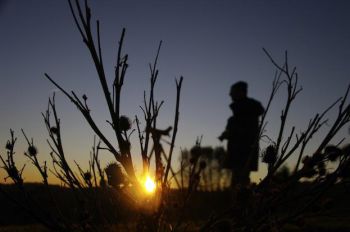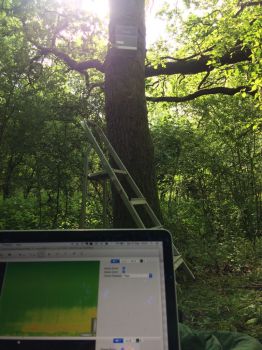Learning to listen to the wild: How Sussex academics are marking International Dawn Chorus Day
By: Patrick Reed
Last updated: Thursday, 3 May 2018


Programmable, weather proof audio recorders are positioned in trees and set to record through the day and night for weeks at a time.
Two Sussex academics are aiming to raise awareness of the biodiversity on our doorstep this weekend with a unique event on the cliffs of Newhaven to mark International Dawn Chorus Day.
Dr Alice Eldridge, whose work includes investigating ways to assess the ecological health of natural environments through soundscape analyses, and Dr Mika Peck, a biologist specialising in conservation, will be celebrating the beauty and diversity of the natural coastline with an overnight camp at Newhaven Community Garden.
International Dawn Chorus Day is a worldwide celebration of the dawn chorus marked by the Wildlife Trust and other conservation organisations across the world, reminding us of the close relationship between human wellbeing and that of all other living species.
Newhaven Soundcamp will be joining in by installing a small radio transmitter on the cliff tops of Newhaven, linking the dawn orchestra of the Sussex biosphere to a network of open microphones around the world, also located at sites of ecological and sonic interest.
Measuring the human impact on the environment continues to present a major challenge for landscape management, and traditional survey methods of ecological health assessment are incredibly time-consuming.
Dr Eldridge and Dr Peck have been carrying out acoustic surveys in temperate habitats, both in and around The Living Coast biosphere reserve in Sussex and in tropical habitats of north-west Ecuador.
They say: “To try to better understand the relationships between the sounds present in each habitat and assess the species that live there, we employ computational analysis to ‘listen’ to the soundscape and test whether these match up with other measures of biodiversity.”
“So far, we see fairly strong correlations between the two for UK habitats, suggesting that the sound mapping of natural environments could be a useful tool in future ecological surveys. Whilst this technology would not replace the expertise of ornithologists, it allows us to carry out rapid biodiversity surveys across areas which we might not otherwise be able to access.
"This project is a really good example of the importance of interdisciplinary research, utilising the experimental thinking of the Sussex Humanities Lab to address concerns central to the Sussex Sustainability Research Programme: it draws on expertise from life sciences, informatics, engineering and music, to come up with innovations which reach beyond any one discipline.
“We’re looking forward to adding the avian chorus of the Sussex biosphere to the airwaves on Sunday morning, celebrating the ecological beauty and variety of our natural surroundings in support of International Dawn Chorus Day.”
Soundcamp Newhaven is organised by the Experimental Music Technologies Lab (Emute lab) in association with The Living Coast. It is supported by Sussex Humanities Lab and Sussex Sustainability Research Programme at the University of Sussex and hosted by Newhaven Community Garden.
You can listen in to the Newhaven Soundcamp live on Sunday morning from 5am on Resonance FM or listen in at any point over the weekend via the locusonus website.